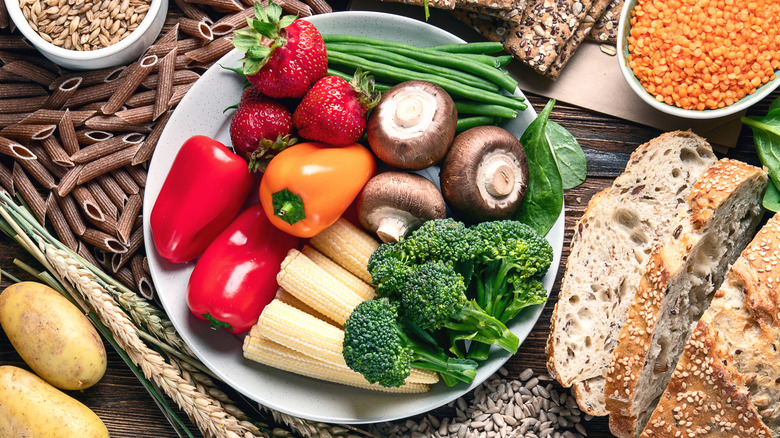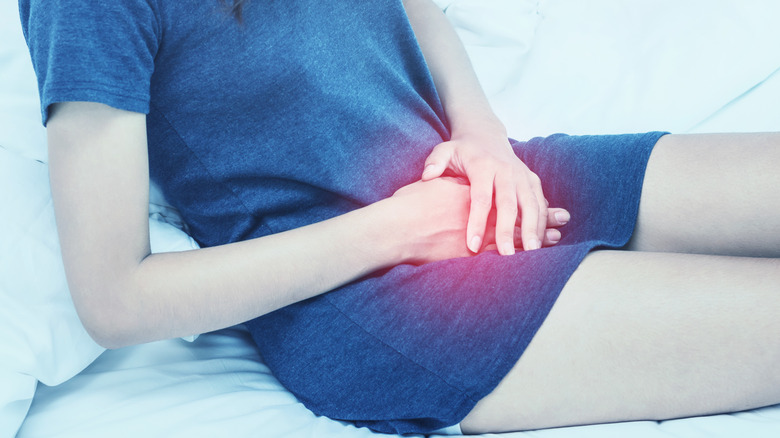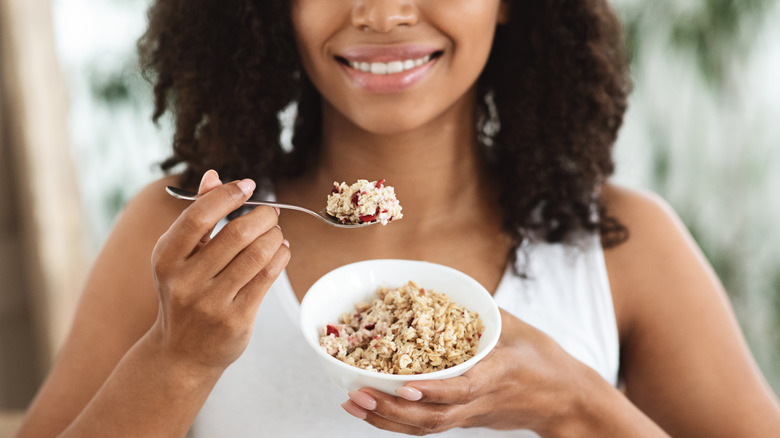How Fiber Intake Impacts Your Bladder
Bladder cancer, cystitis, urinary incontinence, and other related problems affect millions of people, interfering with their daily lives. For example, nocturia causes frequent urination at night, which may result in poor sleep, tiredness, and fatigue, notes the Cleveland Clinic. Another common problem is interstitial cystitis, a condition associated with urgency and pain in the bladder, urethra, lower back, and genitals, explains the Urology Care Foundation. Some of these issues can be addressed through lifestyle changes, such as limiting certain foods and drinks.
The Urology Care Foundation says that acidic foods — especially tomatoes and citrus fruits — irritate the bladder and may worsen your symptoms. The same goes for chocolate, coffee, alcoholic beverages, soda, and spicy foods. Lemons and other citrus fruits, for instance, can cause the urge to urinate, which may pose problems for those with an overactive bladder, according to WebMD. Cranberries, raw onions, sweets, and artificial sweeteners have similar effects.
Luckily, there are still plenty of foods you can eat to keep your bladder healthy. For starters, consider adding more fiber to your meals. This nutrient not only suppresses appetite and keeps you regular, but it may also improve bladder function.
High-fiber diets may protect against bladder cancer
We've all heard that high-fiber foods support digestive health, among other benefits. Both soluble and insoluble fiber may help prevent constipation, reduce blood sugar, and improve blood lipids, notes the Mayo Clinic. What's more, this nutrient protects against obesity due to its appetite-suppressing properties. What you may not know is that fiber-rich diets may lower your risk of bladder cancer, a condition that affects more than 75,000 Americans each year, as reported by the Centers for Disease Control and Prevention (CDC).
A 2020 review of 13 cohort studies published in The American Journal of Clinical Nutrition looked at research conducted on nearly 575,000 people. It showed an inverse association between fiber intake and bladder cancer risk. As it turns out, brown rice and other whole grains may reduce the odds of developing this disease by about 28%. Researchers believe that whole grains may protect against cancer due to their high fiber content, which promotes metabolic health and dilutes carcinogens.
Other fiber-rich foods — especially vegetables — have a protective role, too. A large-scale 2021 study published in BMC Medicine suggests that higher vegetable intakes may reduce the risk of bladder cancer in women, but not in men. Leafy greens, potatoes, cruciferous veggies, and legumes are chock-full of fiber and phytochemicals, which may explain their beneficial effects on bladder health.
Dietary fiber can help relieve bladder problems
A diet high in fiber may also relieve the symptoms associated with an overactive bladder, incontinence, and urinary tract infections, according to Bluewater Urology Associates. This nutrient adds bulk to the stool, which can in turn prevent straining and keep you regular. If your colon is full, it can put pressure on the bladder and reduce its capacity, resulting in more trips to the bathroom. This problem may also worsen urinary incontinence and affect the bladder's ability to empty.
The Interstitial Cystitis Association recommends eating plenty of legumes, quinoa, oats, vegetables, and other fiber-rich foods. Ideally, use whole-wheat flour instead of refined flour in cooked meals and choose whole fruits over juices. For example, a large apple boasts more than 5 grams of fiber, while a glass of apple juice has only 1 gram of fiber, reports MyFoodData. Plus, apple juice contains significantly more sugar, which can irritate the bladder.
Note, though — certain high-fiber foods may not be safe for those with a sensitive bladder, cystitis, or urinary incontinence. The Cleveland Clinic warns that figs, bananas, grapes, nuts, plums, prunes, and strawberries can cause bladder irritation. The best thing you can do is start a food journal to keep track of what you eat. Experiment with different foods, see how your body reacts, and adjust your diet as needed.



